Scott AndersonDeuteronomy 18:15-20 † Psalm 111 † 1 Corinthians 8:1-13 † Mark 1:21-28
A video form of this meditation can be found here. We know the old adage about first impressions and how deeply they imprint an expectation. Such is the case here, I suspect. This is, after all, the inauguration of Jesus’ public ministry—the first impression. It is his inaugural act on the heels of assembling his leadership team. Inaugurations say a lot, I suspect, about our leaders. And each of the gospels underline something a little different about Jesus. Matthew begins with the Sermon on the Mount, presenting us with a version of Jesus who is a definitive teacher. Luke offers a vision statement of social renewal—Jesus as the one to bring good news to the poor. John skips the ceremony and goes straight to the wedding party at Cana and a sudden abundance of good wine to show us a savior who came for life abundant. Mark’s Jesus is a little like Marshawn Lynch was back in the day, I suppose—he’s all about that action, boss. He leaps into the fray. He starts where we are today, in the synagogue—at church, if you like—with a new teaching, with authority. But it isn’t just about words, certainly not empty words, not words alone. These words evoke something big. They have power. They change everything. You know. It’s pretty standard stuff when it comes to what we’ve come to expect in worship, I suppose. A teaching that leads to a loud encounter with an unclean spirit. Screaming. Convulsions. Pews flying. An exorcism. You know Tuesday, or, I guess, Sunday, as it were.
0 Comments
Scott AndersonIsaiah 61:1-4, 8-11 † Psalm 126 † 1 Thessalonians 5:16-24 † John 1:6-8, 19-28
A video version of this sermon can be found here. Just about every Christmas season I return to W. H. Auden’s Christmas long poem “For the Time Being.” I’m not entirely sure why. It isn’t a particularly efficient or even rewarding exercise even as I am drawn to sputtering along in my reading. I do suspect it holds a certain inspiration for me, or at least the promise of it that I am at any moment apt to tap into a reserve of insight and understanding. Perhaps my motivation is wrapped up in some faulty psychology that supposes because it is thick, because it is hard work to understand that it must be worth it. I do get that possibility, so you armchair psychologists can just sit on your hands for the moment. In fact, I think it is the other side of that psychological coin that has something more to do with this strange Advent season in this extraordinary “coronatide” time. It’s the audacity of this time that captures me. It’s the foolishness of this faith that imagines we can mobilize the machinery of the hope required to cut a path through mountains and valleys to make the way straight and wide, when it all seems so, well, not that, so anything, but passable. Foolish indeed. Faith, like love, is never easy. Scott AndersonAmos 5:18-24 † Psalm 70 † 1 Thessalonians 4:13-18 † Matthew 25:1-13 A video version of this sermon can be found here. Keep awake! That’s the message Jesus draws from this murky story in Matthew right before the parable of the talents which we’ll see next Sunday. There’s all this detail in the story—a bridegroom, but no bride anywhere to be found; lamps (which are really torches) and oil. Five brought oil, the other five didn’t. It’s not that they didn’t bring enough, they just didn’t bring any, or maybe they didn’t have any. And apparently there’s an all-night oil shop open somewhere down the road. All ten bridesmaids--virgins actually, fall asleep, by the way. All of them. The bridegroom arrives late, seriously late, and five make it into the party and five are shut out. And Jesus tells his listeners to keep awake. Scott AndersonIsaiah 5:1-7 † Psalm 80:7-15 † Philippians 3:4b-14 † Matthew 21:33-46
Long before our country was founded, this land belonged to the many indigenous tribes who had lived here for thousands of years. The tribes had their own customs and laws. They were deeply connected to the land and maintained rich wisdom traditions that were lost on the Europeans who came to conquer and colonize to sow a trail of tears through the continent. It is also true, of course, that even before European colonization, they fought one another. They were not unfamiliar with the cycles of violence we often find ourselves trapped in. One of the reasons for the constant conflict was a practice known as “mourning wars.” Tribal people had come to believe that the only way they could ease their pain when someone they loved was killed was to return like for like, to take revenge—to kill people from the offending tribe. Scott AndersonOn average, Death Valley gets two inches of rain a year. Two inches. There are two major mountain ranges—the Panamint Range, pictured here, and the Sierra Nevadas beyond them to the West that trap weather systems that would otherwise drop precipitation from the Pacific, making it one of the driest places on earth. Yet it is fair to say that Death Valley, one of the driest places on earth, has been shaped by water. Well, water and tectonics.
Scott Anderson“I’m drawn to places,” writes Eric Weiner, “that beguile and inspire, sedate and stir, places where, for a few blissful moments I loosen my death grip on life, and can breathe again.”[i] He is speaking of what we’ve come to know as thin places.
Heaven and earth, the Celtic saying goes, are only three feet apart, but in thin places that distance is even shorter. The ancient Celts used the term to describe places like the wind-swept isle of Iona where Julie Kae will have an opportunity to spend some time this summer as a part of her sabbatical. Scott AndersonNehemiah 8:1-3, 5-6, 8-10 † Psalm 19 † 1 Corinthians 12:12-31a † Luke 4:14-21
You’ve probably heard the one about lies and statistics. It’s a quote from Mark Twain, from about 1906 that he attributed to the British prime minister Benjamin Disraeli. Rather than repeat it here, let me just defer to a less colorful paraphrase of it from a letter to the editor of the British newspaper the National Observer: “Sir, —It has been wittily remarked that there are three kinds of falsehood: the first is a ‘fib,’ the second is a downright lie, and the third and most aggravated is statistics.”[I] Anyway, I found myself thinking about this, and about statistics in particular, as I was preparing for today, and trying to get a sense of what Luke is trying to claim about Jesus and his work in this text. Jesus stands up among his hometown folk and reads from Isaiah: “The Spirit of the Lord is upon me, because he has anointed me,” And then the rest of it reads like a mission statement, which is, I think, Luke’s purpose. This, Luke suggests, is what Jesus is up to, what he is about, what God is doing in this promised one of unprecedented power and truth. “He has anointed me,” Jesus reads, to bring good news to the poor. He has sent me to proclaim release to the captives and recovery of sight to the blind, to let the oppressed go free, to proclaim the year of the Lord’s favor.”[ii] The passage is plain, and the work is straightforward, although it may take a little unpacking. But Old Testament scholar Walter Brueggemann, in his recent book Tenacious Solidarity is concerned that we may miss the plain sense of the text. Here’s why. He says: “we have been schooled, for a variety of reasons, to read the Bible in categories that are individualistic, privatistic, other-worldly, and “spiritual.”[iii] Now, he is getting old. Perhaps he’s worried about what he sees, as he nears the twilight of his long career and his life. But he makes a compelling case that we are prone to step away from the plain meaning of this gospel to our peril. Maggie BreenZephaniah 3:14-20 † Isaiah 12:2-6 † Philippians 4:4-7 † Luke 3:7-18
Well that was quite a turn wasn’t it. From the smooth certain assurances of the psalm: “Surely, it is God who saves me; I will trust and not be afraid. For the Lord is my stronghold and my sure defense, and God will be my Savior.” And from the bright jubilation of Zephaniah: “Sing aloud, O daughter Zion; shout, O Israel! Rejoice and exult with all your heart, O daughter Jerusalem! The Lord has taken away the judgements against you, he has turned away your enemies. The king of Israel, the Lord, is in your midst; you shall fear disaster no more.” And from the lovely appeal for gentleness and patient prayer in Philippians: “Rejoice in the Lord always; again I will say, Rejoice. Let your gentleness be known to everyone. The Lord is near. Do not worry about anything, but in everything by prayer and supplication with thanksgiving let your requests be made known to God.” From all of that to John: “You brood of vipers – who told you to flee from the time to come…..His winnowing-fork is in his hand, to clear his threshing-floor and to gather the wheat into his granary; but the chaff he will burn with unquenchable fire.’” Scott Anderson1 Kings 17:8-16 † Psalm 146 † Hebrews 9:24-28 † Mark 12:38-44 Beware the comma! It can change everything. It can be a matter of life or death. It can be the difference between “Let’s eat, grandma,” and “Let’s eat grandma.” Or consider another sign I saw not too long ago:  “Hunters, please use caution when hunting pedestrians on the trails” …which could have benefitted from a comma so that it would suggest that one should be aware of the presence of others while hunting. Now when it comes to our ancient biblical texts, there is an added problem. As you may know, the original texts of both the old and new testaments didn’t have commas, or really, any punctuation at all! Scott AndersonJeremiah 31:7-9 † Psalm 126 † Hebrews 7:23-28 † Mark 10:46-52
So how do you tell the difference between a crowd and a mob? How do you know? What are those markers that help to make the distinction? Mark tells us at the beginning of today’s gospel lesson that Jesus and his followers pass through Jericho, and just as quickly, they leave. Nothing happens, except that Mark notes a large crowd follows Jesus out of town. Or is it a mob? Or a caravan? I would imagine once the word made it to Jerusalem, it might have felt like a mob—at least to the political and religious leaders of Jerusalem who felt the pressure of an unsettled population. Especially after Bartimaeus refuses to remain silent: “Son of David, have mercy on me.” In other words, do something. |
St. Andrew SermonsCategories
All
|








 RSS Feed
RSS Feed